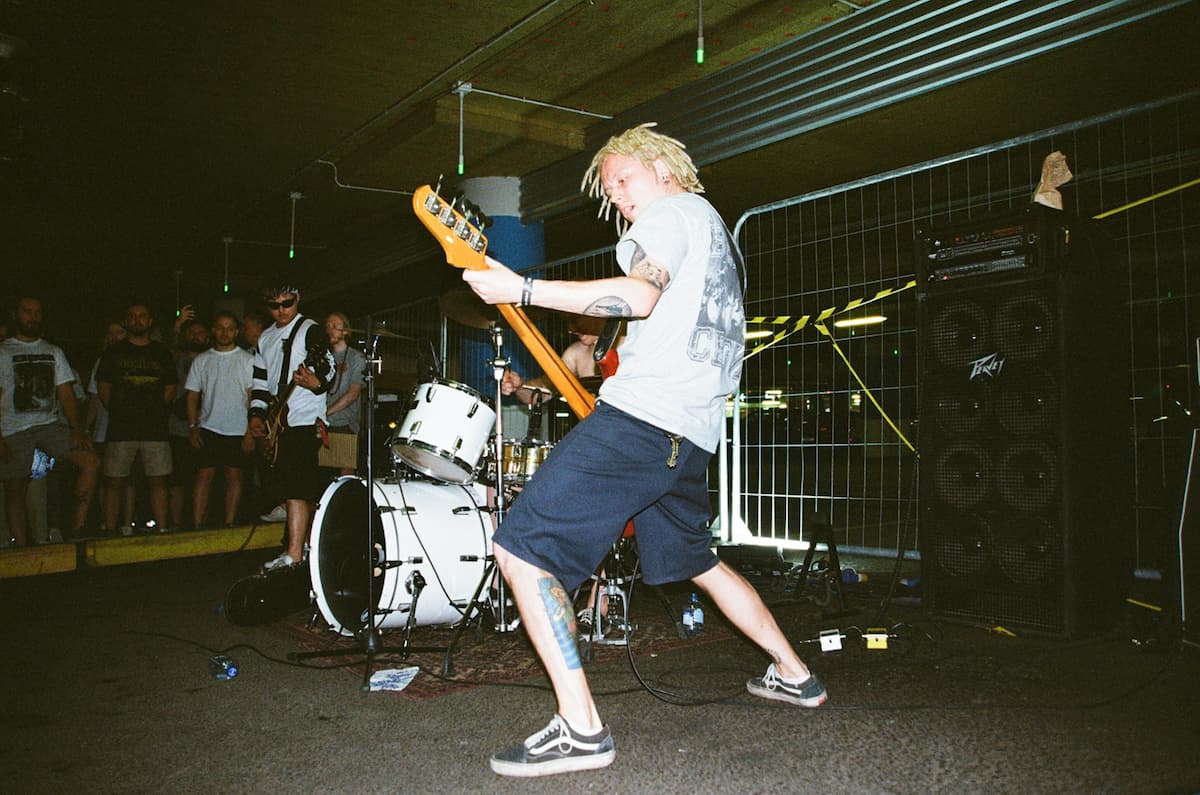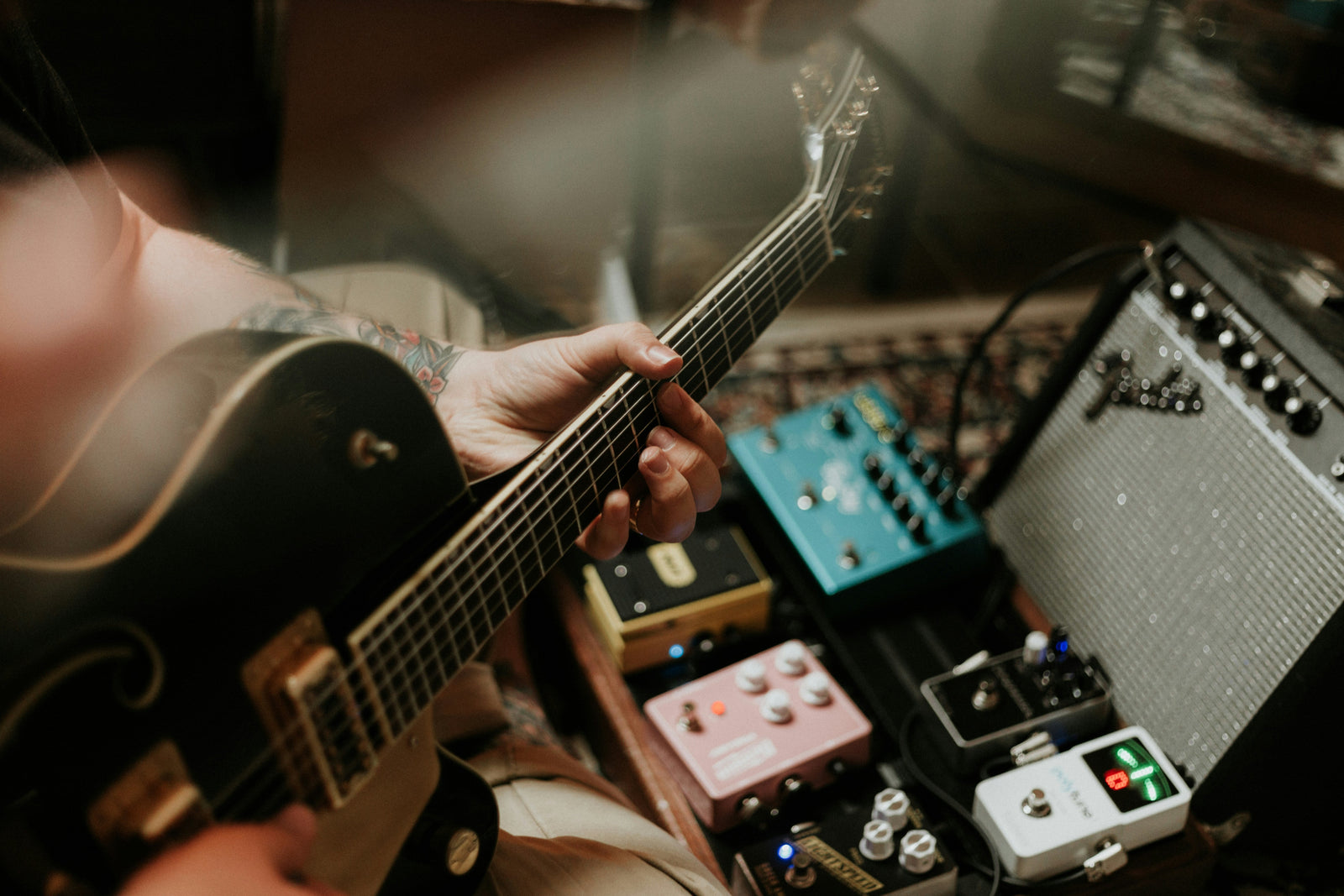BOSS Guitar Pedals: BASS
Effects for bass playing are crucial; choose those that enhance your lower-register rhythms. Basses enjoy unique effects, like modulation and echo, unlike guitars, for distinctive tones.
BOSS, renowned for exceptional craftsmanship, offers a broad range of high-quality basses. They are ranging from entry-level to advanced. These basses set a standard with their distinctive tone. They have been making it appealing to players for over 25 years.
BOSS guitar pedals bass are invaluable, providing a unique and authentic sound. You can craft an authentic tone without the need for various pedals.
Identify effects complementing your music style, ensuring an appealing and genuine sound.
What Are BOSS Guitar Pedals Bass?
Bass guitar pedals are versatile tools, catering to various genres like rock and funk. BOSS guitar pedals bass offer a simple way to achieve a warm tone without intricate effects. It provides convenience to its users.
The term 'bass' signifies the lowest note in a chord or guitar line. Spanning different bass instruments. It includes electric, acoustic, double bass, and fretless 4-string double bass.
Designed for bass, these effects pedals grant greater control over lower notes. Mimicking qualities of higher-pitched instruments like acoustic pianos or guitars.
Effects, altering bass guitar tones, range from subtle to drastic. Bassists lean towards subtle effects, maintaining clear, defined notes essential for rhythm playing.
Exploring effects can be exciting, but many, like echoes or pitch changes. Yet, may compromise clarity in real-world bass playing.
As a rhythm player, your role emphasizes well-defined notes. It makes effects like echoes and pitch alterations less practical. Avoid competing with guitarists who use a variety of effects. This is because their musical responsibilities differ.
In the realm of bass playing, select effects that enhance. Avoid those that detract from your primary role.
Why You Should Get BOSS Guitar Pedals Bass?
Bass guitar pedals play a vital role in shaping the sonic landscape for bass players. Incorporating a quality bass pedal into your setup is crucial for enhancement.
First, these pedals provide a means to infuse character into your playing. They serve as a creative tool. Allowing you to shape your tone and add distinctive elements to your bass lines. This versatility empowers you to express your musical personality and style more.
Second, bass pedals enable you to play with more aggression and dynamic expression. They offer control over your sound. This allows you to adjust parameters such as attack and sustain. This flexibility is ideal when aiming for a more intense or impactful performance, enhancing your ability to convey emotion through your playing.
Furthermore, these pedals contribute to the expansion of your tonal range. By manipulating various effects and settings, achieve a broader spectrum of sounds. From subtle nuances to bold, experimental tones.
This versatility is invaluable for bassists looking to diversify their sonic palette. Also, to explore different musical genres.
Creating new sounds becomes accessible with bass pedals. Their intuitive controls and diverse functionalities open up avenues for experimentation. Whether you're crafting intricate bass solos or exploring ambient textures.
Suppose you want to push the boundaries of conventional bass playing. These pedals provide the tools for innovation.
In the realm of bass guitar, the availability of pedals in various styles, and types. Price ranges ensure every player can find the right fit for their preferences and budget. From affordable to feature-rich, the market caters to diverse bassist needs.
How Do Effects Pedals Work on Bass?
Bass players, ever curious about that deep tone? Pedals aren't for guitars alone; they're fantastic for bassists too! Bass pedals offer sought-after sounds with Distortion, Crunch, Bass Fuzz, and Tremolo effects.
They expand your bass's range, allowing muddy effects across keys without losing resonance. They sit between your guitar and amp. Enhancing punch and aggression for jazz, rock, country, and blues.
Pedals play a significant role for bassists, adding tone layers, and dimension. While clean playing is an option, effects help you cut through the stage mix with extra bite or cut.
Let's hear it for Wil from Basic Gear Review as he shows us how the BOSS ODB-3 sounds on his bass guitar!
What Are The Types of BOSS Guitar Pedals Bass?
Bassists use a variety of effects pedals to enhance their sound. These pedals come in different types, shapes, and sizes, offering versatile applications. Various effects pedals cater to distinct tonal needs, providing benefits for bassists.
Some pedals focus on a single effect. While others offer many tonal control options within a single unit. This versatility allows bassists to define or change their tone.
Here's a list of common effects types for bassists:
1. Tuner
The bass tuner pedal simplifies tuning. Providing a visual frequency display for precise adjustments. It reads the bass note's frequency, assessing resonance at different levels.
The tuner indicates how the note aligns, aiding in identifying fretboard issues. Correcting string height ensures improved band sound quality.
This pedal facilitates hands-free tuning, allowing focus on other tasks. Additionally, it aids in understanding instrument responses to various notes and chords.
2. Compressor
Bass compressor pedals serve to even out and enhance the signal produced by a bass guitar. It reduces variations in volume and minimizes noise. The leveling effect ensures all musical parts stay distinct and audible. It enhances a polished and balanced composition, ensuring clarity for each element's sound.
The key function of a compressor is to tighten the dynamic range of the bass's output. It regulates both soft and loud elements. Avoiding extreme volume changes, ensuring consistent sound.
Beyond volume control, compressors add a touch of power and punch to the bass signal. They achieve this by refining the low and high frequencies without introducing distortion. This allows the bass to cut through the mix more. Providing a strong presence without sacrificing clarity.
Compressors offer a versatile tool for musicians. Some users use them to emphasize specific elements within a track. While others explore their potential as dynamic filters.
3. Wah and Filter
If you're new to the wah pedal or planning an early guitar gig, consider a bass wah and filter pedal. These pedals offer versatility, adding depth, lead lines, harmonies, or experimental soundscapes.
The wah effect, a type of filter, tweaks the signal's frequency, providing a twisted tone. A foot pedal allows easy toe-tapping around the effects pedals. Filters, present in most effects chains, enhance tone without compromising quality.
Bass wah and filter pedals often stack, featuring a simple design with three controls. It is the frequency (low/high), resistance (decrease/increase), and speed (faster/slower). Explore these pedals for creative, dynamic sound possibilities in your music.
4. Bass Octaves
A Bass Octaves pedal is a crucial addition to your signal chain. Regardless of your music style or amp setup, there are times when you need silence.
Ideal for bass players seeking dimension and movement in their sound. The Octaves pedal adds octave shifts without volume control.
These unique pedals split the signal into two, creating a two-octave effect. They mix the signals, producing simultaneous low and high notes. Placed in or behind the signal chain. They add color and control frequencies, creating octave-rich sounds.
Perfect for enhancing your playing and offering versatility in different musical scenarios.
5. Bass Overdrive/Distortion/Fuzz
Ever wondered about bass distortion pedals? Despite the name, it's not about playing bass on stage. Your instrument's bass enhances chord progressions for a fuller sound. Preserving mids is key—distortion and overdrive boost midrange without losing a bite. Enhance your sound for a balanced and powerful performance.
For bass players seeking extra color in their live sets, a bass overdrive pedal is ideal. It enhances volume and definition without sacrificing low-end thickness. Add a touch of flavor to your bass tone for a standout performance.
6. Noise Suppressors
Ensure your bass setup is flawless—placing it too close to the amp causes issues. Unwanted noise and uneven frequency response affect your bass's performance.
A noise suppressor is a pedal board essential. Combating interruptions in your creative flow. Designed to preserve tone while eliminating unwanted sounds, the noise suppressor is crucial. Protect your signal chain by placing the suppressor and enjoy a seamless performance.
7. Bass EQ
Bass players face the challenge of managing their instrument's volume. It is within the range most audible to the human ear, between 60Hz and 500Hz. To address this, an EQ (equalization) pedal becomes a crucial tool.
This pedal allows bassists to boost or cut specific frequencies. Fine-tuning them to align with the optimal tonal range for human hearing. The outcome is a more balanced and nuanced sound. It aligns the volume with the natural perception of sound.
With an EQ pedal, bassists sculpt low-frequency characteristics. Also, customizing the tone's resonance through the amplifier. This enhances control over the musical output.
8. Bass Modulation
Modulation is a post-tone effect. It occurs after tone-producing elements like distortion or fuzz.
A bass modulation pedal introduces a vibrato-like effect. It is by modulating either amplitude or spectrum frequencies.
This modulation allows manipulation and transformation of your bass guitar's tone. Transitioning from a clean sound to a more impactful and dynamic presence.
9. Delay/Echo/Reverb
For various sonic needs, there's a purpose-built delay pedal. Placed after the guitar, amp, and speakers. Abass delay/echo/reverb pedal introduces depth by repeating segments of the signal. Common types include chorus and echo pedals, each serving unique sound-enhancing roles.
The delay pedal takes an original signal and replicates it. Meanwhile, a reverb pedal simulates echoes, influenced by distance and reflective surfaces. These effects contribute to shaping a rich, nuanced bass sound.
BOSS Guitar Pedals: Bass
- BC-1X Bass Comp
- BB-1X Bass Driver
- CEB-3 Bass Chorus
- GEB-7 Bass Equalizer
- LMB-3 Bass Limiter/Enhancer
- ODB-3 Bass OverDrive
- SYB-5 Bass Synthesizer
Top BOSS Guitar Pedals Bass: ODB-3 Bass OverDrive
The BOSS ODB-3 Bass OverDrive pedal is a must-have for bassists seeking distortion. Designed for bass, it delivers chest-thumping distortion. It is perfect for hard rock, thrash, and punk genres. This compact pedal is a versatile tool for creating a range of tones.
Unleashing the beast in your bass is effortless with the ODB-3. Its range spans from subtle overdrive to roaring distortion. Perfect for any sound contour. Crafted to maintain clarity, it handles low notes, even on 5-string basses.
Key features of the ODB-3 include:
- Balance control - Mix the effect with the dry sound, maintaining your bass's strength and presence.
- 2-band EQ - Offers versatility, making it more than an overdrive pedal.
- Wide tonal range - From aggressive, fuzzy tones to a subtle growl, suitable for various modern genres.
The ODB-3 stands out as a powerful tool for bassists. It ensures your bass sound stays full and clear, avoiding muddiness. Its design caters to the modern bassist, offering an array of sound options to explore.
The BOSS ODB-3 Bass OverDrive pedal is essential for bass players. It allows for immense creativity and sound exploration. Making it a valuable addition to any bass pedal setup. On stage or in the studio, the ODB-3 guarantees bone-shaking bass distortion.
BOSS Guitar Pedals Bass: Frequently Asked Questions
What is the difference between a bass pedal and a guitar pedal?
The key difference between bass and guitar pedals lies in their frequency targeting. Crafters design guitar pedals to shape the mid to high frequencies common in guitars. In contrast, bass pedals focus on enhancing and manipulating lower frequencies.
- Guitar pedals emphasize the guitar's natural tones, which are higher than a bass.
- Tailored for depth, bass pedals enrich the resonant sounds of a bass guitar.
- Using a guitar pedal on a bass might result in a thinner sound, as the pedal may not capture lower frequencies.
In essence, both types of pedals change sound. They are fine-tuned for their respective instruments. This specialization ensures that each pedal brings out the best in either the guitar or the bass. Selecting the ideal pedal is vital for achieving the desired sound and tonal quality.
What makes a bass guitar sound better?
Enhancing bass guitar sound involves blending various playing styles. Fingerpicking, using a pick, or slap bass can diversify your tone. Quality strings and regular maintenance are crucial for optimal sound. Proper amplifier settings can highlight your bass's best qualities.
Your bass's setup, including action and intonation, affects its sound. A well-set-up bass ensures comfort and optimal tone. Use effects pedals to enhance sound without muddying it. Familiarity with your instrument is key to better sound quality. The more you know your bass, the better it will sound.
Does a bass need an amp?
A bass amp is not essential for basic learning like fretting or scales. Yet, it's important for clarity and depth of sound. Solid-body basses are quiet, especially lower notes.
An amp brings out the bass's character and is crucial for performances. Amps also let bass players explore various tones and effects. They're key for developing an ear for tone and dynamics.
For home practice, a small amp enhances the playing experience. Headphone amps are a good alternative in noise-sensitive areas. While not needed for beginners, an amp enriches the bass experience.
What do compression pedals do for bass?
A bass compressor pedal balances your playing. It is leveling the volume across all notes. It boosts quieter sounds while tempering louder ones, ensuring consistent output.
This effect is crucial for maintaining the dynamic range of each string. It eliminates any unevenness in your playing. The result is a smoother, more uniform bass sound.
Compression is ideal for both live performances and recording. It adds polish and professionalism to your bass tone. Additionally, it helps to make every note clear and audible. Compressors are especially useful in genres where the bass plays a leading role. They enhance the bass's presence in the mix.
BOSS Bass Guitar Pedals: Conclusion
BOSS guitar pedals offer a world of versatility for bass players. These pedals enhance playing dynamics and tonal richness. Whether it's the deep growl of overdrive or the polish of compression, BOSS delivers.
They're essential for both studio recording and live performance. BOSS guitar pedals transform the bass sound, ensuring it stands out in any mix.





